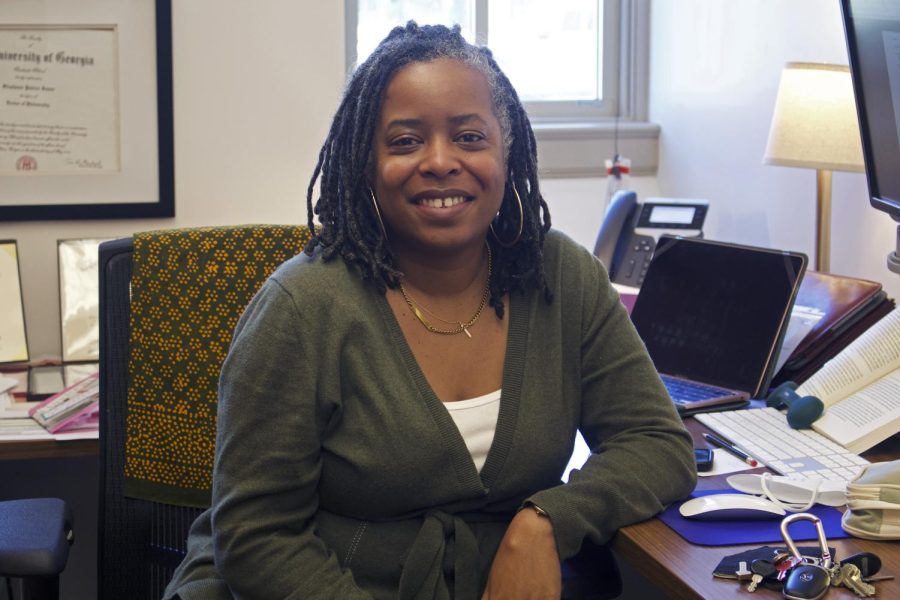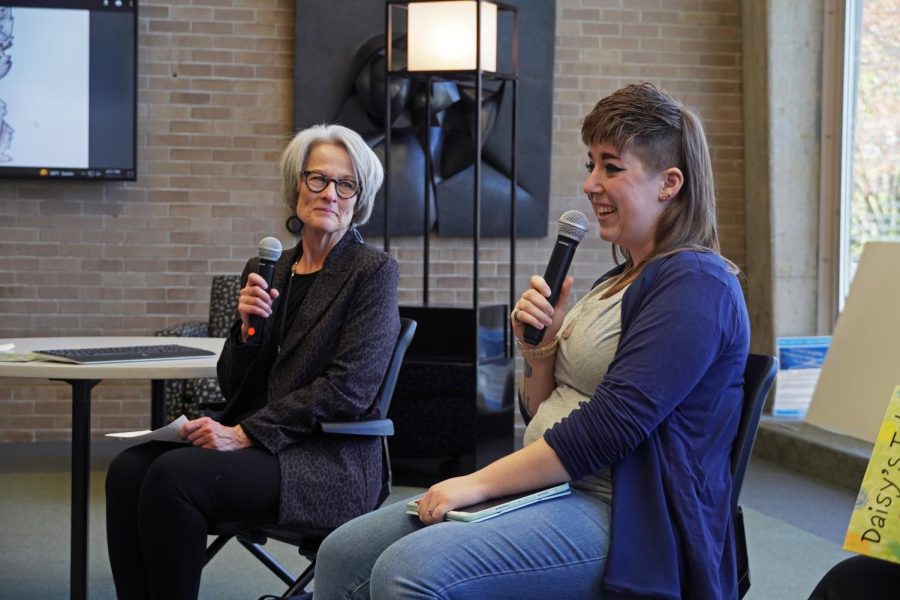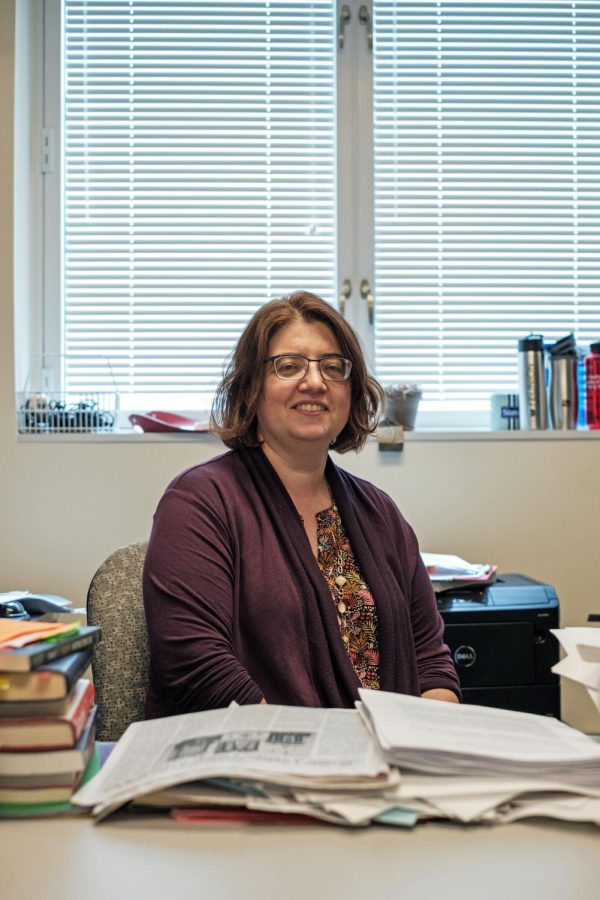By Eleanor Corbin and Allison Moore
For students who have been assaulted or harassed, directional no-contact orders through the Title IX office are a crucial opportunity to restore their sense of safety on campus.
One student pursued this option, hoping it would allow her to live at Grinnell without fear of encountering her perpetrator. Instead, she found that the promised protections were vague, unenforced and required her to consistently stay vigilant to avoid her perpetrator’s violations of the contract in public spaces like the Spencer Grill.
“It’s always me who leaves first,” she said.
The S&B talked with two students who recently filed complaints with Title IX and still have concerns about their safety on campus. They have been granted anonymity due to the sensitive and recent nature of their situations, although their pronouns will be used to contextualize the gender-based component of their stories by their request.
Recent Title IX Cases, Enforcement and Limitations
These students feel that there is a disconnect between the support they received from the Title IX office versus the actuality of their protections and the enforcement process.
“Student A,” who filed a claim after repeated incidents of stalking and harassment, said the alleged perpetrator is still on campus. “I don’t feel safe here,” she said.
She has since been granted a directional no-contact order by the Title IX office. A no-contact order is a contract signed by both parties in which one party agrees to avoid being in the same place as the other. The specifics of the order, such as where the perpetrator is and is not allowed to go, are decided on a case-by-case basis.
Once the complaint is on file, the student has to decide whether to go forth with a voluntary or formal process. “We want to make sure the complainant has the agency to decide the course of action they might like to take,” said Bailey Asberry, the College’s Title IX Coordinator.
With a voluntary process, both the complainant and the respondent have to agree to the terms of the resolution. Sometimes this type of resolution is deemed unproductive, so the complainant may choose to proceed with a formal resolution. The formal resolution begins with a detailed notice of investigation, followed by a third-party investigator who conducts a report.
The report is followed by a live hearing and then a case opinion. That opinion proceeds to the senior officials, who make the final decisions. Jin Feng, associate dean and professor of Chinese and Japanese, handles cases involving faculty, Mary Greiner, assistant vice president of human resources, handles cases involving staff, and Ben Newhouse, associate vice president of student affairs and dean of students, decides for cases between students.
Student A said she is concerned about the vagueness of the no-contact order for when her perpetrator is in the same location. She has found her perpetrator in many common spaces around campus and said that they rarely leave, despite her understanding that if they enter a space where she was first, they must.
Since the creation of these contracts, however, the student said she feels that she is not receiving the protections she initially hoped to have.
“What I don’t understand is why the no-contact order doesn’t just restrict [them], it restricts me,” she said.
After the alleged violations, Student A reached out to Asberry for information on what to do if the perpetrator does not follow the no-contact order. She said Asberry told her that any disciplinary actions or enforcement decisions are not the jurisdiction of the Title IX office.
Asberry is responsible for guiding students through the Title IX process and helping them create protections like no-contact orders. Enforcement of no-contact orders for students falls with Ben Newhouse, Deputy Title IX Coordinator for student conduct process.
After their meeting, Student A said that Asberry informed Newhouse of the alleged violations. Student A said that Newhouse has yet to reach out to her.
She feels her main support system at this time is her friend group. She also cites Asberry as a supporter and a person who has provided her with ample resources for her own personal wellbeing.
The other student with whom the S&B talked, “Student B,” sought help from the Title IX office after repeated online sexual harassment from a fellow student. She also opted for a directional no-contact order with the Title IX office.
Student B’s perpetrator violated the order when they showed up to an event meant specifically for her class year, a year to which her perpetrator does not belong. This event is one among several that she had to leave due to this circumstance.
Within the protections of her contract, the perpetrator has agreed not to show up to events where they know Student B will be present. Student B said she believes that showing up to an event for her year despite not being in that year violates that boundary.
“There’s some spaces where I really want to know [they’re] not going to be and I have no guarantee of that, even though I’m contractually supposed to,” said Student B.
Student B says she went directly to Newhouse after the violations occurred. He allegedly determined that there was not enough intent to warrant disciplinary action. She did not feel the response to her complaint was proactive.
“The response I get from him [Newhouse] is essentially, well, people go places, and sometimes people who aren’t in certain years show up to events for certain years,” she said.
In response to how students should handle violations and insufficient contracts, Newhouse writes in an email to the S&B, “I would encourage them to meet with me to discuss that. … And if someone feels like the other party has violated the expectations set forth, I would want to know about that right away so that we can address that in the most appropriate way.”
Once a voluntary directional no-contact order is violated, Newhouse is the sole determiner if there is intent enough to warrant disciplinary action or consequence. Newhouse says that he consults Asberry in cases like these.
When asked about whether she had heard of the recent violations of no-contact orders — prior to her conversation with Student A — Asberry said, “I have not had any reports to me that a no-contact order has been violated as far as I can remember … I hope that that would come to me.”
Additionally, the students feel that there have been oversights in terms of their protections. With housing, for instance, both students’ perpetrators were relocated into dorms within the same cluster as them. For Student B, her perpetrator now serves on a student group that she cannot avoid due to her major, preventing her from being able to run for a position within the group herself or participate in many of the events.
These alleged violations of the no-contact order and enforcement oversights have led the students to feel that the agreements are limiting their movement around campus more than they understood to be outlined in their contract.
In regards to how he determines if a violation has the intent behind it to warrant disciplinary actions, Newhouse said it mostly comes down to individual circumstance. Newhouse and Asberry are both unable to comment on specific student cases for confidentiality reasons.
“I have to evaluate whether it’s more likely than not that a violation occurred. There’s not a lot of benefit of doubt for the other person [the perpetrator],” he said, “and there’s a background experience that informs that. And so those could be difficult circumstances where a person might feel it varies one way and the determination is different.”
When faced with situations where a student reports that a perpetrator has violated their no-contact order, Newhouse said he talks with both parties before making a decision.
“In terms of whether something’s purposeful or accidental, I’m not going to make that judgment without talking to the parties. So, it’s never one of those things where someone sends an email and I go, ‘Well, that’s not an issue,’” said Newhouse.
The Title IX Office, Process and Support Systems
Title IX is a federal civil rights law first created in 1972 that prohibits sex-based discrimination in schools or organizations receiving federal funding. Since its creation, Supreme Court cases and a variety of decisions made by the Department of Education have broadened its scope to handle sexual assault and harassment cases. As such, Grinnell College has an office dedicated to handling Title IX related offenses.
Asberry serves as the only full-time administrator who deals solely with Title IX. Her job is to “oversee the College’s compliance with Title IX, to make sure our policies are updated, and to make sure that the process is followed fairly and thoroughly,” she said.
For anyone thinking about filing a complaint with or simply talking with the Title IX office, the complicated conduct process can seem daunting. Asberry assures that if a person seeks her guidance, she will explain the conduct process and other supportive measures.
The Title IX office is located in Nollen House, an administrative building and more private on-campus space that is not frequented by students. Asberry said she hopes that the privacy of the building provides a sense of security to any student wanting to talk with her.
If a student wants to disclose more information and proceed beyond supportive measures, Asberry would walk them through the conduct process. Asberry said, “That’s always the first thing we want to make sure of, are they safe? Have they been in touch with confidential support?”
Students who choose to proceed beyond receiving supportive measures must file an official complaint. Asberry said “the law [Title IX] said now that in order for the college to take any investigative action of any kind, we’re required to have a formal complaint submitted by the complainant.”
To make this process more straightforward and comprehensible, Asberry has created a Qualtrics form that can be found on Grinnell’s sexual assault webpage. There are also rare moments when Asberry has the jurisdiction to fill out the form herself, but that depends on the situation and the amount of information she has. “I have to be really careful about the moments when I choose to fill out that form,” she said.
During an initial meeting with the Title IX office, a student would be allowed to have a support person in the room, whether that be a lawyer, family member or friend. Then, Asberry would first talk about supportive measures, “because a lot of times in that initial meeting, they don’t really want to talk about the conduct process, they want to talk about care,” Asberry said.
Some of these means for support include getting in contact with SHAW or other medical health professionals, contacting professors if the student has trouble focusing on work and putting the student in touch with Academic Advising.
One support system that exists for victims is Grinnell Advocates, a student-led group that exists as a confidential resource for anyone going through the Title IX process or anyone who simply wants to talk about their experiences.
The Advocates maintain a 24-hour advice hotline for both calling and texting at 641-260-1615. Emma Rose Mills `23 and Claire Kopachik `22 are two of the 11 crisis-intervention-trained student advocates on campus. They both said peer-to-peer support is essential to handling these kinds of situations.
Mills and Kopachik said they want students to know that there are resources out there for them, and that the difficulties of navigating the Title IX process should not bar anyone from seeking the help they need.
“I have felt a lot of frustration and I totally empathize with that frustration. I felt some of that frustration myself,” said Mills. “We’re here to support, Bailey’s here to support … we’re all here.”
They also want any students who are unhappy with their current Title IX accommodations to know that Grinnell Advocates can also help advise students seeking a new or different contract.
“I would encourage people to reach out to us, and we can advocate for them to maybe have it [their contract] reviewed earlier than that minimum amount, and advocate for themselves,” said Kopachik, “because they deserve to feel safe on campus, and where they live, where they learn, to feel safe to interact with their peers.”































































